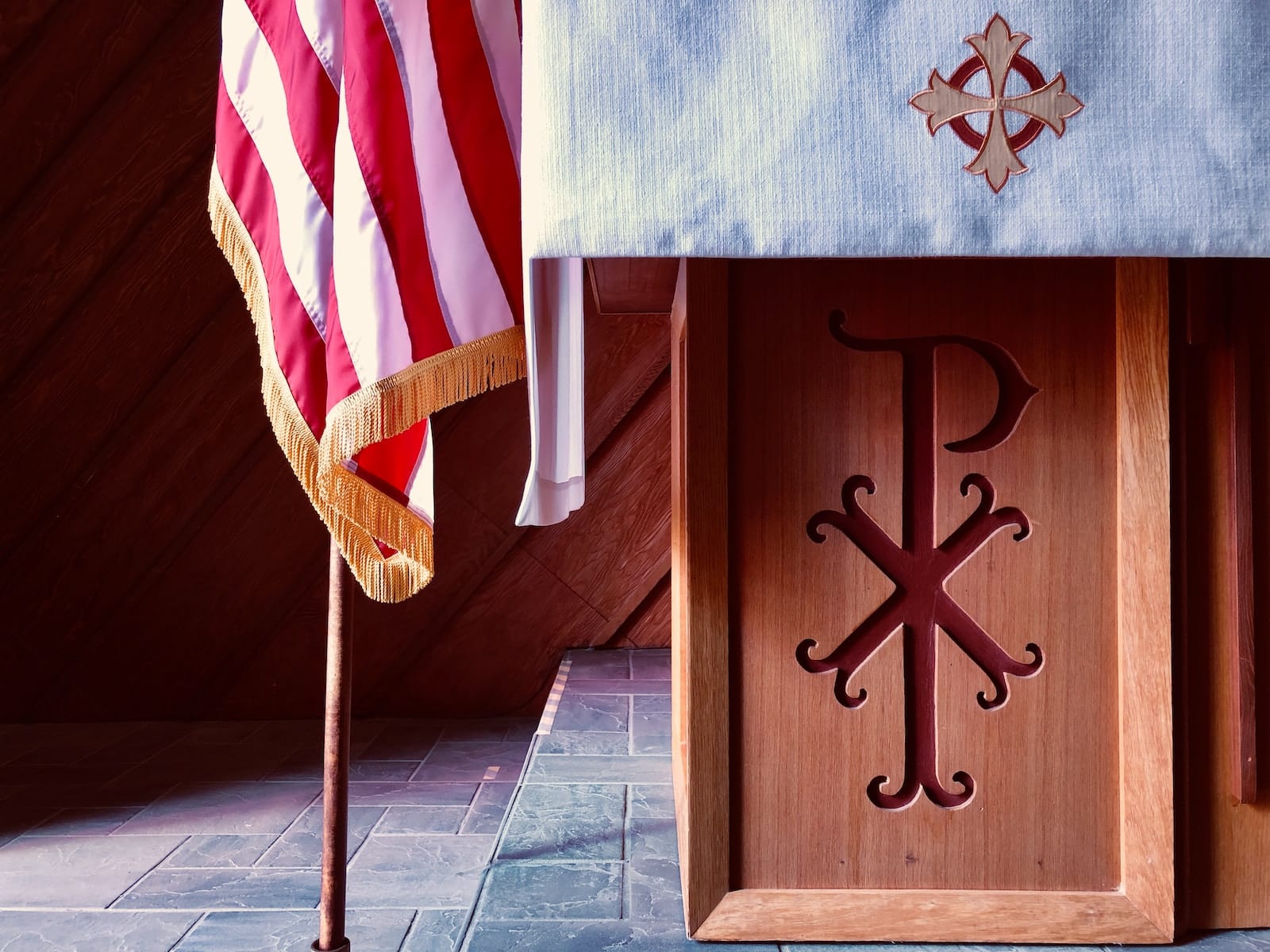If what is meant by Christian nationalism today is a form of active patriotism in which borders are protected, national sovereignty is enforced, and society moves back toward a Judeo-Christian ethic, call me a Christian nationalist. However, few have studied the European nationalist movement. Fewer still understand that leaders of this new movement are giving it a makeover. This improvement is an attempt to rebuild something that was actually broken and required additional inspection.
Redefining terms is not a novel occurrence. It’s existed since the beginning when the serpent said to Eve in the garden, “Has God said…” (Genesis 3:1). Despite any change in definition, however, how much of a word’s etymology remains intact?
For example, marriage once meant the union of one man and one woman in the covenant bonds of matrimony for the benefits of family, society, and the glory of God. Marriage has been redefined as any partnership between two consenting adult persons for their own self-fulfilling benefit, regardless of gender. Even as the culture strives to change the definition, the essential components of this tradition remain, both in practice and understanding.
This reality should cause Christian nationalists to reconsider the current push to redefine nationalism. Similar to how Alexandria Ocasio-Cortez introduced the prefix “democratic” to the terrible ideology of socialism, many have affixed the word “Christian” to nationalism.
The popularity of this new phrase has shifted from a leftist pejorative aimed at shutting down debate to serious consideration within evangelical circles. As Christians wrestle with the countless definitions of Christian nationalism, Stephen Wolfe’s book, A Case for Christian Nationalism, seeks to posit an affirmative position.
However, the questions remain: does Wolfe’s definition include any of nationalism’s etymological baggage? Has combining Christianity with nationalism purged it of its symbiotic relationship with ethnocentrism and ethnic pride?
I will demonstrate that Wolfe’s version of Christian nationalism is positioned at the dangerous intersection of nationalism and ethnocentrism, pushing the boundaries of how far Christian nationalism can go before morphing into something more sinister.
Can Nationalism be Christianized?
In his book, Stephen Wolfe writes that he endeavors to position his form of Christian nationalism as “nationalism modified by Christianity.” He writes,
“My definition of Christian nationalism is a Christianized form of nationalism, or, put differently, a species of nationalism. Thus, I treat nationalism as a genus, meaning that all that is essential to generic nationalism is true of Christian nationalism.”
Wolfe, Stephen. The Case for Christian Nationalism (p. 10). Canon Press. Kindle Edition.
Wolfe’s statement raises several questions: Can nationalism be Christianized? Does Wolfe’s version of CN lack the ethnic pride of previous attempts at nationalism? Does ethnocentrism comport with Christianity? Does the emphasis on Christianity purge its adherents of their sinful ethnic divisions through the unity we find in Christ? (Ephesians 2:15)
If Wolfe’s ambiguous language (i.e., his exchange of the word “ethnicity” for “nation”) is any indication, Christian nationalism is no different from nationalism in its basic form. Wolfe writes,
“I use the terms ethnicity and nation almost synonymously, though I use the former to emphasize the particular features that distinguish one people-group from another… nation is used to emphasize the unity of the whole, though no nation (properly speaking) is composed of two or more ethnicities.” (Emphasis mine)
Wolfe, Stephen. The Case for Christian Nationalism (pp. 135). Canon Press. Kindle Edition.
If Wolfe’s vision proceeds and “no nation (properly speaking) is composed of two or more ethnicities,” what becomes of the multi-ethnic American experiment? Which ethnic group will be the lone bulwark to experience the privilege of participation in Wolfe’s Christian nation?
More importantly, proponents of this version of Christian nationalism will need to determine which ethnic group they feel akin to and which they will willingly give up. Wolfe offers this advice as he writes,
“Think of the people with whom you feel at ease conducting your daily life; with whom you share similar expectations of conduct, aesthetic judgments, and recreational activities… and with those, you can join in a common life that achieves the highest ends of man.”
Wolfe, Stephen. The Case for Christian Nationalism (p. 136). Canon Press. Kindle Edition.
According to Wolfe, these are “your people.” The challenge with Wolfe’s ideas as they relate to ethnicity is that, at different points in his writing, he expresses inclusivity with those who are different. At other points, he presents a very ethnically homogeneous picture of Christian nationalism. Press him on this issue, and according to Wolfe, you’ve either misrepresented what he said or you haven’t read the book.
CN is, in many ways, a reactionary response to much of the resentment resulting from a post-George Floydian culture. CRT/I, social justice, and wokeism have aligned themselves along ethnic lines, forcing white people to choose between being an ally or being accused of racism. Neither the embrace of the CRT/I nor the Christian nationalist response is helpful to peaceful coexistence in a multi-ethnic society.
Is Christian Nationalism White Wokeism?
In 2017, social justice activists were happy to avoid answering questions about the implications of their ideology, asserting that no one could adequately define terms. Words like “critical race theory,” “wokeism,” and “social justice” were obscured by a cacophony of subjective definitions. Similarly, the flurry of differing ideas associated with Christian nationalism allows many of its proponents to argue again that, while they hold to Christian nationalism, their definition differs from the one currently being used, thus making criticism moot.
Many would contend that the struggle for social justice and the propagation of Christian nationalism share no similarities. I disagree. Both are responses to feelings of subjugation and powerlessness. Each seeks a top-down government-facilitated remedy for their concerns. Both are willing to cede authority to the government for the benefit of their respective peoples. Both parties recognize that constitutional powers, such as the First Amendment, must be constrained to advance their cause.
Though Christian nationalists and those striving for social justice have different ideas of justice, the common good, and the benefits of the societies they would create, they have a common goal. Both seek to create a utopian vision of a society where people are safe, prosperous, and empowered.
While Christian nationalism and social justice share commonalities, CN is not white wokeism; it is, however, a response to wokeness. Many CN proponents have rightly been concerned as they’ve witnessed the legalization of same-sex marriage, the embrace of critical race theory and intersectionality, and the legalization of grooming through Drag Queen Story Hour.
Some have grown tired of carrying the weight of the social justice onslaught, as every cultural disparity is blamed on white supremacy and racism. Many view CN as a muscular response to these issues. However, there is a biblical response to these issues that does not require embracing nationalism.
Defining Terms
The Encyclopedia Britannica states, “Nationalism is an ideology that emphasizes loyalty, devotion, or allegiance to a nation or nation-state and holds that such obligations outweigh other individual group interests.”
This system protects national sovereignty, and constituents are expected to place the nation’s interests above their own private, personal, or self-interests. In this way, the nation is seen as more than the sum of its parts. It is considered an entity in and of itself, with values, ideals, and interests that supersede any individual or group.
By contrast, Stephen Wolfe’s “Christian Nationalism,” while embracing aspects of ethnonationalism, which I will address later, defines Christian nationalism as, “A totality of national action, consisting of civil laws and social customs, conducted by a Christian nation as a Christian nation, in order to procure for itself both earthly and heavenly good in Christ.”
While the definition is something with which most would agree, a closer reading of Wolfe’s work would explain one of the roles of the civil magistrates as it punishes evil. Wolfe writes,
“The question is whether a Christian magistrate, having civil rule over a civil society of Christians, may punish (with civil power) false teachers, heretics, blasphemers, and idolaters for their external expressions of such things in order to prevent (1) any injury to the souls of the people of God, (2) the subversion of Christian government, Christian culture, or spiritual discipline, or (3) civil disruption or unrest. Modern religious liberty advocates deny this, and I (Wolfe) affirm it.”
Wolfe, Stephen. The Case for Christian Nationalism (p. 359). Canon Press. Kindle Edition.
The questions that must be asked are, “Who defines who is and is not a false teacher, a heretic, or a blasphemer? Will the Presbyterians decide? Will the Baptists decide? What will be done with Mormons, Catholics, or Muslims in a Christian nation? If we have determined the state religion is Christian, how can others express their faith?”
In this version of Christian nationalism, believing something contrary to the civil magistrates is permissible. However, there will be prohibitions from expressing it publicly. Wolfe acknowledges that one cannot be compelled to believe, which is to his credit. However, any public expression of belief contrary to Wolfe’s Christian nation, once protected by the First Amendment, may now be considered an offense against the souls of God’s people and punished as a crime.
Unfortunately, Wolfe’s version of nationalism maintains consistency with the kind of German volkism that paved the way for ethnic German nationalism. While proponents may balk at the comparison, Wolfe embraces the idea when he writes,
“Blood relations matter for your ethnicity because your kin have belonged to this people on this land—to this nation in this place—and so they bind you to that people and place, creating a common volksgeist.”
Wolfe, Stephen. The Case for Christian Nationalism (p. 139). Canon Press. Kindle Edition.
Wolfe uses similar language of “blood and soil,” (blood and place) when describing his ethnic group as those with a genetic connection and those who have been on the land. You see, nationalism has consistently embraced ethnonationalism, which favors one group, known as “our people,” over others. This form of ethnonationalism can be seen in history as ethnic German nationalism and has justified its actions against people they deemed “undesirable” or “inferior.”
Does Wolfe recognize the problems that his Volksgeist movement presents? As he initiates dialogue with those who have questions, he often disarms his opponents by acknowledging that he will be accused of being a fascist, chauvinist, xenophobe, or racist. All of this is done to prevent the interviewer from attributing these notions to him when he presents them to you.
Wolfe then explains how nationalism is different this time. Combining the power of the civil magistrate and the authority of the church through a Christian prince, as mentioned in his book, he commits one of many errors by placing his trust in immoral men. The separation of governmental powers (checks and balances) serves a purpose. Implementing a Christian Prince, as Wolfe does, would be counterproductive to his cause.
Which Way, Western Man?
As readers of Wolfe’s book open the first page of chapter one, most are unknowingly exposed to a pull quote from white nationalist writer Samuel Francis who said, “Tribal behavior’ is what makes human beings human…”
Far from a case of guilt by association, even as Wolfe chooses who he quotes, he makes clear who his natural audience is for his book. Wolfe writes,
“One might accuse me of assuming and norming the ‘Western European male’ experience in this chapter. I am not worried about this, since I am male, and am rooted ancestrally in Western Europe, and am speaking largely to a Western European male audience. I fully acknowledge that my goal is to reinvigorate Christendom in the West—that is my chief aim. The question for most of my audience is, ‘Which way, Western Man—the suicide of the West or its revitalization?’”
Wolfe, Stephen. The Case for Christian Nationalism (p. 118-119). Canon Press. Kindle Edition.
While there’s nothing wrong with writing a book for Western white men, I am curious as to who Wolfe is signaling as he uses a quote from a book titled, Which Way Western Man? written by White Nationalist William Gayley Simpson.
Wolfe distances himself from the white nationalist dog whistle in the footnote, which few read, he writes,
“…This is not a “white nationalist” argument, for in my view, the designation “white,” as it is used today, hinders and distracts people from recognizing and acting for their people-groups, many of which (to be sure) are the majority “white” but are not on the basis of a modern racialist principle.
With his white male audience in view, Wolfe builds out his homogenous ethnocentric nation. As Wolfe turns his attention to the subject of intermarriage, he understands that these unions will happen but doesn’t recommend them. In a September 2022 tweet, Wolfe writes, “And thus, while intermarriage is not itself wrong (as an individual matter), groups have a collective duty to be separate and marry among themselves.”
Wolfe’s present take on nationalism positions his cause on the dangerous intersection of Christian nationalism and ethnocentrism. I strongly advise followers to abandon this insufficient worldview.
Conclusion
As an Air Force veteran, I have raised my right hand and sworn to protect and defend the United States Constitution. I am familiar with patriotism and national pride. Despite all of its current faults, America remains a beacon of freedom and hope. Those of us who have donned a military uniform and voluntarily placed ourselves in harm’s way to defend the liberties we enjoy, we are devoted to enhancing the American experience.
For the past few years, as CRT/I, social justice, and wokeism made their way through evangelicalism, I’ve been committed to pushing back against the racist ideology represented by black liberation theologians and Black Lives Matter advocates. I reject the idea that my only hope to win the battles that we face is through some form of Christian nationalism.
The weapons of our warfare have the divine power to destroy ideological strongholds. Current answers notwithstanding, I’ll stick to what works. It’s the Gospel of Jesus Christ and well-equipped believers living out their faith in the public square. We must not grow weary as we continue to be a prophetic voice to a sinful culture.





